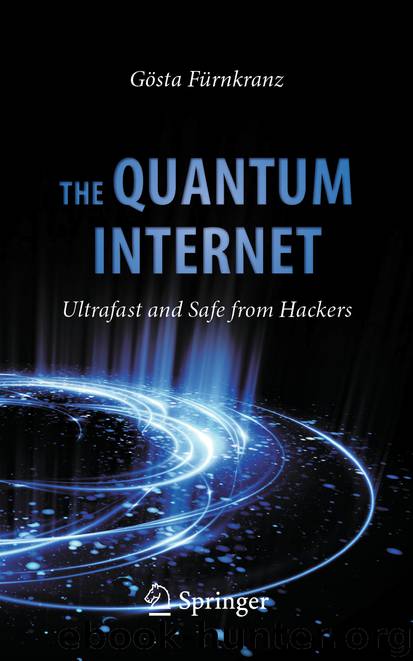The Quantum Internet by Gösta Fürnkranz

Author:Gösta Fürnkranz
Language: eng
Format: epub
ISBN: 9783030426644
Publisher: Springer International Publishing
The effects of the Grover algorithm can be illustrated by imagining a Mikado game. From a large number of Mikado sticks with the same length and diameter, 4 pieces are extracted and placed in the shape of a square on a piece of paper. Now, a number of N dots is drawn into the enclosed area, which represent the number of search entries. If N is very large, the number of dots will fill the square almost completely. Somewhere in this amalgamation of dots is the one that corresponds to the search entry. In the worst case, a classical computer would have to sift through all of the dots before arriving at the correct one. And that could be a while! A quantum computer, however, works in a fundamentally different way. Quantum parallelism enables it to throw the remaining Mikado sticks in a random jumble onto the square. With very high probability, one of the sticks will exactly hit the correct dot. This is because the length of the Mikado stick corresponds exactly with the lateral edge of the square with the area N, and so it only needs to sift through a number of dots until it has found the one it was looking for. If none of the sticks hits the correct dot, the process is repeated. With every repetition, the probability to find the required solution increases.
Quantum Simulators
The domain where the advantage of quantum simulators is especially significant is the simulation of other quantum systems that cannot be calculated in the classical way, for example in the area of materials science. Every solid has a crystalline structure consisting of billions of atoms or molecules. It is an unimaginably complex quantum system. Its electron states are actually described by the Schrödinger equation, which can theoretically be used to predict every atom, every molecule and thus also the behavior of the entire solid. This is true only in theory, though. Every student of physics knows that the solution of the Schrödinger equation for a hydrogen atom in the ground state is already quite complex, even as this is actually the most straightforward problem. More complex states can only be treated approximately, and even that becomes impossible for powerful computers or supercomputers with 50–60 atoms or more. Therefore, new calculation models that are as close to reality as possible are desirable. Richard Feynman developed the basic idea for quantum simulations which will be presented in the following. In 1982, Feynman proposed an “analog quantum computer ” that was not based on digital coding, but imitated nature. A completely different system is used for this, its properties however can be transferred analogously to a partial aspect of the system that is to be simulated. These properties can then be examined without having to simulate the system itself (with the associated savings in storage space and processing power). In this way, the quantum simulator stores and processes the information independently, so to speak, which makes it a quantum computer. Quantum simulators could, for example, predict the behavior of superconductors much more efficiently.
Download
This site does not store any files on its server. We only index and link to content provided by other sites. Please contact the content providers to delete copyright contents if any and email us, we'll remove relevant links or contents immediately.
| Blogging & Blogs | eBay |
| E-Commerce | Hacking |
| Online Searching | Podcasts & Webcasts |
| Search Engine Optimization | Social Media |
| Social Media for Business | Web Browsers |
| Web Marketing |
Secrets of the JavaScript Ninja by John Resig Bear Bibeault(21366)
Kotlin in Action by Dmitry Jemerov(20425)
Grails in Action by Glen Smith Peter Ledbrook(17371)
Sass and Compass in Action by Wynn Netherland Nathan Weizenbaum Chris Eppstein Brandon Mathis(14803)
WordPress Plugin Development Cookbook by Yannick Lefebvre(4416)
Ember.js in Action by Joachim Haagen Skeie(4307)
Mastering Azure Security by Mustafa Toroman and Tom Janetscheck(3542)
Learning React: Functional Web Development with React and Redux by Banks Alex & Porcello Eve(3183)
The Innovators: How a Group of Hackers, Geniuses, and Geeks Created the Digital Revolution by Walter Isaacson(3165)
A Blueprint for Production-Ready Web Applications: Leverage industry best practices to create complete web apps with Python, TypeScript, and AWS by Dr. Philip Jones(3131)
Mastering Bitcoin: Programming the Open Blockchain by Andreas M. Antonopoulos(3036)
The Art Of Deception by Kevin Mitnick(2796)
Drugs Unlimited by Mike Power(2591)
Hands-On Cybersecurity with Blockchain by Rajneesh Gupta(2463)
Kali Linux - An Ethical Hacker's Cookbook: End-to-end penetration testing solutions by Sharma Himanshu(2390)
Writing for the Web: Creating Compelling Web Content Using Words, Pictures and Sound (Eva Spring's Library) by Lynda Felder(2349)
SEO 2018: Learn search engine optimization with smart internet marketing strategies by Adam Clarke(2262)
JavaScript by Example by S Dani Akash(2218)
DarkMarket by Misha Glenny(2207)
